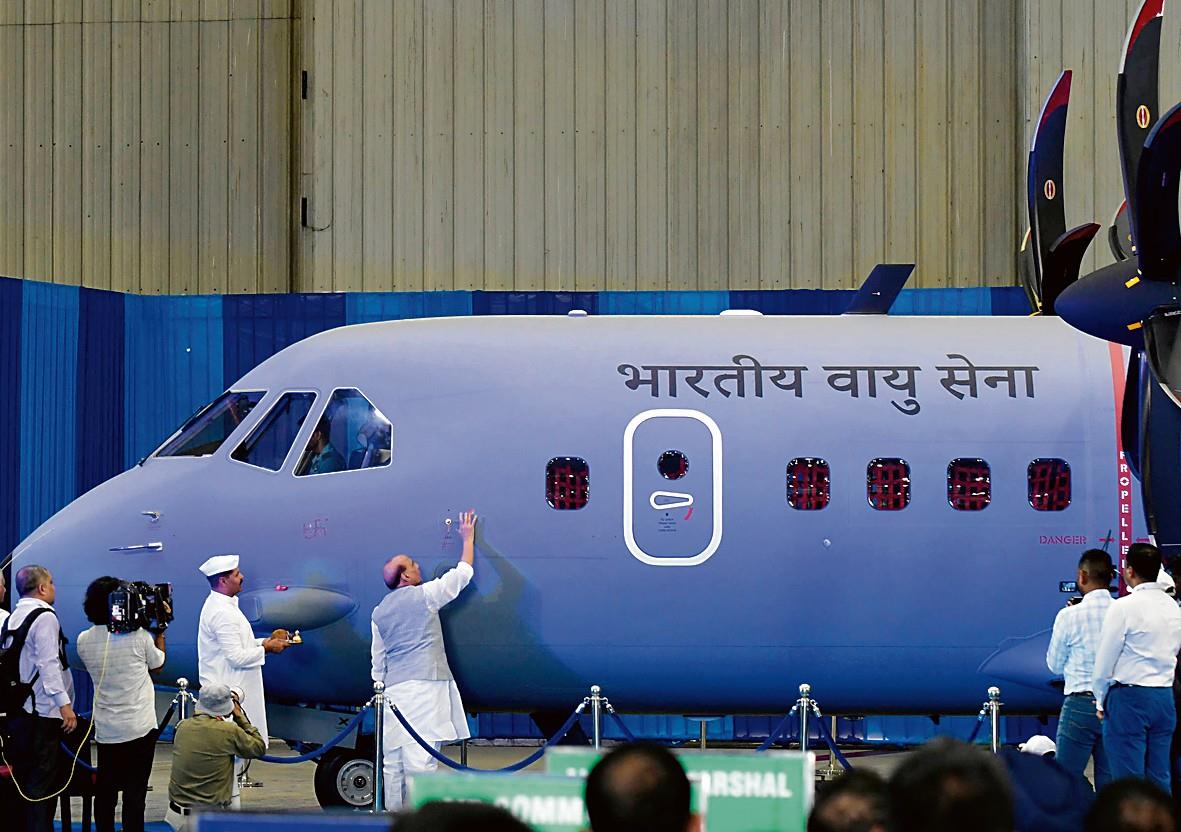Monday, the first C-295 military transport plane from Spain to India arrived. The Spanish ambassador, Jose Maria Ridao, was happy about this and said that Madrid wants to be a “very trusted bilateral partner” for New Delhi. On Monday, an event was held at the Hindan Air Force Station to welcome the plane into the Indian Air Force.
Defense Minister Rajnath Singh, Air Chief Marshal VR Chaudhari, and top officials from the Indian Air Force (IAF), Airbus, and Tata Advanced Systems (TASL) were at the ceremony, as well as Ridao.
The medium tactical transport aircraft got to Vadodara on September 20, just a few days after being given to the IAF in Seville, Spain, where Airbus has a factory.
“The first plane (C-295), which is part of this program, is coming from Spain, and we are very happy about that. At the same time, we are very involved with this program, and we think it’s a great chance to become an important partner for India in the defense industry. So, today is a great day for Tata, for Airbus, for Spain, and for India as well.
There will be 16 planes coming from Spain to India. TASL will get ready to make and put together the rest of the planes here during this time. He said that 40 planes will be made in India as part of the plan.
This program is important to Spain and the Spanish government because it gives them “a chance to share technology with our partners.” Ridao said that it was a “great honor” for Spain to work with India in this area.
By 2025, Airbus will have finished putting together the first 16 planes at its final assembly line in Seville. The next 40 planes will be made and put together by TASL in India as part of a business relationship between the two companies.
He also talked about the P75(I) submarine program of the Indian Navy.
“We are also making subs… We hope that India will choose us and our company to work on these subs,” he said.
The Indian Navy is getting six conventional submarines made in India. This is being done by the defense minister. The submarines will be made in India, and it is believed that there will be a lot of work done there.
Larsen & Toubro and Navantia, a big defense company in Spain, signed a “teaming agreement” in July to put in a joint bid for the program.
“When Spain says it will deliver the product on a certain date, they can believe us because we deliver this product to India. So, that’s the main thing to learn. I want to stress that Spain’s promises can always be believed and are always kept,” he said.
Ridao said that India is now seen as “a huge country” by the rest of the world. So, Spain “cares a lot about how India is seen.”
At the same time, Spain does not want to “reduce our relations” to trade, business, or even this important area of defense.
“…We would like a whole-person method. India is not just a market. We’re glad to have this partnership in the defense business, but we’d also like to improve our relationship in terms of culture. For example, we think we need to work a lot on visas. “It’s a big deal,” the Spanish representative said.
“That’s why our consulates are getting better here (in India). Our office will open in Bangalore. Our embassy office in Delhi will get better. We have to wait for the Indian government to give us approval. In August, we told the Indian side that they could open a consulate in Barcelona. And we’re waiting for our port in Bangalore,” he said.
He also said that there is a consular section in New Delhi, a consulate general in Mumbai, and one coming soon in Bangalore.
Ridao said that multilateral efforts like the G20 and others are very important for diplomatic relations between the two countries.
“But we try to get the message across that it’s important to be part of these initiatives, but it’s also important to be partners with each other,” he said.
“So, we’d like to be a very reliable partner with India on both sides. Ridao said, “The proof is that the areas where we work, like the defense industry, but also the cultural and consular areas, are also important.”
He emphasized cooperation in the cultural field and said that Spain would be happy to “collaborate and cooperate” with India to share experiences in the public domain, which includes UNESCO heritage places.
Spain has one of the most UNESCO World Heritage Sites of any country.
The Instituto Cervantes is a culture center for Spain in Delhi.
“In India, we don’t look at arts from a nationalist point of view. We are not trying to show how proud we are of our culture. We want to show something different. Culture is something that all people share. Both Spain and India made big contributions to culture. We don’t want to share our culture with India, but we do want to share what we bring to our shared cultural history. So, this is how we’re going to do it,” he said.
